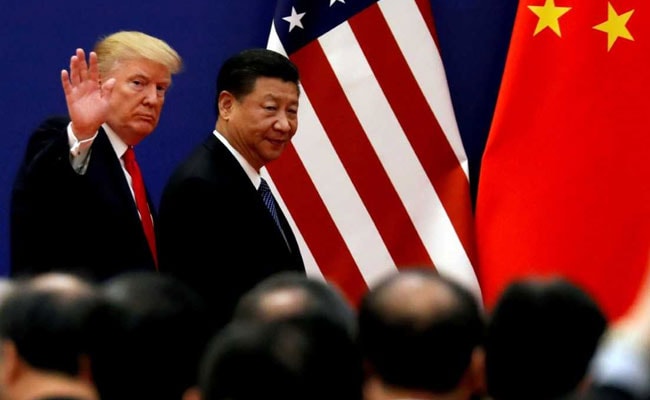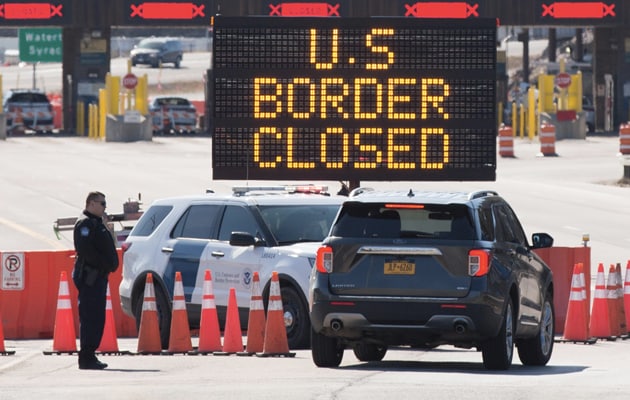China slapped tariffs on a range of US products and announced a probe into Google moments after President Donald Trump imposed a 10% tariff on goods from Beijing, reigniting a trade war between the world’s largest economies.
China will investigate the US tech giant for alleged antitrust violations, according to a Tuesday statement from the State Administration for Market Regulation. Beijing hit US coal and liquefied natural gas exports with a 15% levy, and targeted its oil and agricultural equipment with a 10% fee.
Authorities also put Calvin Klein owner PVH Corp. and US gene sequencing company Illumina Inc. onto a so-called blacklist of entities, as well as imposing new export control on tungsten-related materials.
“The US’s unilateral imposition of tariffs seriously violates the rules of the World Trade Organization,” China’s Finance Ministry said in a statement announcing tariffs. “It is not only unhelpful in solving its own problems, but also undermines the normal economic and trade cooperation between China and the US.”
President Xi Jinping’s response appeared carefully targeted to avoid major blowback on China’s economy while showing Trump an ability to inflict damage on a range of fronts, including by disrupting the critical minerals supply chain and hurting US companies with major operations on the mainland.
That restraint, coupled with speculation that Xi may do more to bolster China’s economy, led to a relatively muted reaction in markets – particularly as Trump signaled a desire to speak with the Chinese leader before the tariffs took effect.
The dollar rebounded after the news, while the offshore yuan extending its loss to 0.3% and the currencies of Australia and New Zealand, which have strong trade links to China, slid almost 1%. Other Asian currencies like the Thai baht and the Indonesian rupiah pared their gains.
‘Measured and Appropriate’
China’s response was “measured and appropriate,” according to Dylan Loh, assistant professor of politics at Nanyang Technological University in Singapore.
“It allows Beijing to be seen as doing something, without exactly reacting in a manner that would be seen as inviting further retaliation,” he added. “I think Beijing also sees what Canada and Mexico did, and know that they can still come to some sort of understanding.”
Xi’s government swung back with its retaliation almost immediately after US tariffs came into force. That action dashed hopes that Beijing would reach a deal to avoid the tariffs, after Trump said he would speak to Xi soon. The Republican hours earlier granted Canada and Mexico a last-minute reprieve from a 25% tariff following leader talks.
The US supplied about 6% of China’s LNG imports last year, according to ship-tracking data. China imports little coal from the US. Google’s search and internet services for consumers have been unavailable in China since 2010, although the company retains operations in the country, primarily around its advertising business.
“This can be interpreted as a warning shot to US enterprises with a high-dependency on China’s market,” said Lynn Song, chief economist for Greater China at ING Bank in Hong Kong. “There is still hope that tariffs could get quickly unwound or pushed back after face-to-face talks.”
Song called the steps a “fairly muted retaliation,” noting that energy accounts for a small share of China’s imports from the US.
China is the largest producing country of tungsten, accounting for about 80% of the global production. Tungsten, known for its remarkable density and high melting point, acts as a buffer against intense temperatures and is most commonly used in armor-piercing missiles in the defense industry.
PVH is also the parent of Tommy Hilfiger and has been under Chinese regulatory investment since September for allegedly boycotting cotton from the Xinjiang region, through the statement did not mention the issue. Illumina is the leading global provider of genetic sequencing, and a rival to Chinese biotech giant BGI Genomics Co.
Trump over the weekend ordered a blanket levy on Chinese exports to take effect after midnight on Tuesday in the US, for what he calls Beijing’s failure to prevent the flow of illegal drugs. The orders included retaliation clauses that would increase tariffs if the countries responds in kind.
A more aggressive response from Beijing would risk a spiraling of US-China relations that had been on a more stable footing since Xi and then US leader Joe Biden sat down in San Francisco in November 2023.
Both countries have resumed high-level exchanges despite persisting tensions over tech access and territorial disputes. Xi and Trump spoke by phone before his inauguration to discuss trade, TikTok and fentanyl.
Trump said Monday the two leaders would speak again, “probably over the next 24 hours,” an assertion to which Beijing hasn’t publicly responded.
(Except for the headline, this story has not been edited by NDTV staff and is published from a syndicated feed.)



